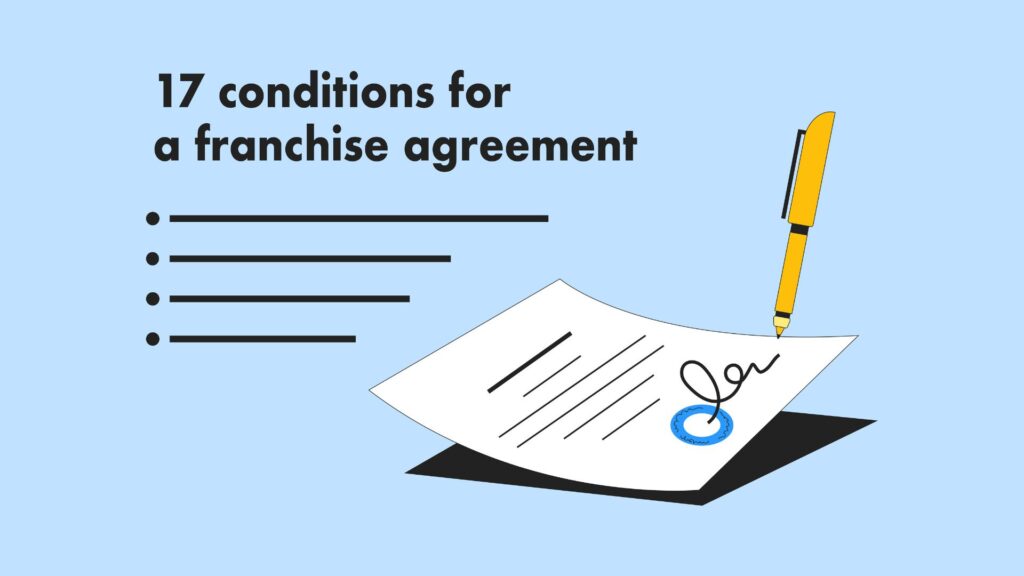A franchise agreement is a legal contract that sets the terms for using a franchisor’s property and operating a franchise business. In this article, we explain what to expect from common franchise agreement terms and conditions.
Franchises help businesses expand with lower operating costs and help individuals start their own businesses with the support of an established brand.
The franchise relationship requires a lot of trust from both parties, which is why it needs to be governed by a clear legal contract known as a franchise agreement. These agreements outline the rights and responsibilities of both the franchisors and franchisees.
In this article, we explain how franchise agreements work and detail 17 key elements found in most of these agreements.
Whether you’re a prospective franchisee or a new franchisor, we have you covered with all the information you need to navigate these contracts.
Key Takeaways
- A franchise agreement is a legal binding agreement between a franchisor and a franchisee that sets the terms of their business relationship.
- Franchise agreements often favor franchisors, but franchisees benefit from accessing a recognized brand name and guidance from an established business.
- There’s no standardized template form for a franchise agreement. Each franchise brand establishes its own terms and conditions.
- However, there are a number of common terms and conditions found in most franchise agreements. These include trademark, territory, arbitration, recordkeeping, and more—we cover 17 in this article.
- Both parties should understand the terms of the franchise agreement before signing. Lawyers familiar with franchise agreements can help you identify potential issues and avoid misunderstandings.
What Is a Franchise Agreement?
A franchise agreement is a legal contract that establishes the terms of a business relationship between a franchisor and a franchisee. You can think of it as a roadmap that guides the two parties’ collaboration.
The franchisor owns the franchise system and grants the franchisee the right to operate a business using their brand, trademarks, and business system. In return, the franchisee pays an initial franchise fee and ongoing royalties to the franchisor.
This agreement often sets the foundation for a long-term collaboration between the franchisor and franchisee. It outlines both parties’ responsibilities and obligations and helps ensure a mutually beneficial working relationship.
Franchise Agreement Definitions
Understanding the language used in franchise agreements is key to understanding the agreement as a whole. Some common terms you’ll come across include:
- Franchisor: A person or company who authorizes a franchisee to do business under their trademark or trade name.
- Franchisee: A person or company who pays a franchisor for the right to do business under the franchisor’s trademark or trade name.
- Prospective Franchisee: A person or company exploring the possibility of entering into a franchise relationship before signing the actual franchise agreement.
- Franchise Disclosure Document: This document is required by the Federal Trade Commission (FTC). It outlines essential disclosures a franchisor must provide to a prospective franchisee before finalizing the franchise agreement.
- Royalty: The primary method of payment in a franchise agreement. Royalties are usually calculated as a percentage of the franchisee’s total sales and paid to the franchisor on a monthly basis.
- Trade Name: The protected name under which a business operates, such as “Subway” for Subway Restaurants. Franchisees can do business operations using this trade name.
- Trademark: The protected symbols associated with a business, such as logos, symbols, and company slogans. For example, the golden arches logo is a McDonald’s trademark.
Pros and Cons of Franchise Agreements
There are both benefits and drawbacks to signing a franchise agreement and setting up a franchise operation. It’s important to weigh up the pros and cons before taking the leap.
Pros of franchise agreements
Access to an established brand
When a franchisee enters into a franchise agreement, they gain access to the brand name of an already successful business. The brand has built a solid reputation, which makes attracting customers and creating meaningful business relationships much easier.
Operations guidance and support
Under a franchise agreement, franchisees receive support from franchisors—including comprehensive training, operations guidance, insight into marketing strategies, and more. Franchisees don’t have to struggle to figure out the recipe for success on their own. They can tap into the franchisor’s successful business model and industry expertise.
Cons of franchise agreements
Limited control
Because business owners let go of some control when they become franchisors, they tend to set strict guidelines over how franchisees may operate. Franchisors require franchisees to operate similarly to ensure customers receive the same goods or services at all locations.
Likewise, franchisees lack control over some business decisions.
Financial obligations
Franchisees must pay upfront and ongoing payments to the franchisor in exchange for the right to use its brand and systems.
Franchisors are favored
Typically, franchise agreements favor the franchisors who set the terms initially. This can create a power imbalance between the two parties.
💡 Pro tip:
Take your franchise management to the next level with Connecteam, the ultimate all-in-one employee management app.
Say goodbye to the chaos of scattered communication and disjointed operations and unlock a whole new world of efficiency and productivity. From smart scheduling and time tracking to seamless communication and hassle-free training and compliance, Connecteam has got your back.
What Information Is Included in a Franchise Agreement?
The following 17 terms and conditions are commonly included in a typical franchise agreement. Let’s look at what these terms are and what each term means.

Written Agreement
In order to be enforceable, the entirety of a franchise agreement must be in writing and signed by both the franchisor and the franchisee.
A number of individual terms, such as “termination” or “non-compete,” also need written notice between the two parties.
Franchisor’s Trademark and Other Intellectual Property
Here is where the main purpose of the franchise agreement is outlined. It details how a franchisee will be allowed to use the franchisor’s intellectual property. This usually includes the use of the franchisor’s name, trademarks, service marks, logos, slogans, and other signage. Operating systems like unique cashier software are also covered here.
Territory
This term will cover whether the franchisee has exclusive rights to a designated area. This exclusivity means that other franchisees won’t be able to open a franchise within the same region or territory. Too many franchises in the same area can lead to oversaturation and make it harder for individual franchisees to compete.
💡 Pro Tip:
Look for exclusive rights to a territory and research existing competitors in that location. If there are already others operating the same franchise or a similar business in that area, it could indicate oversaturation that may limit a new franchise from thriving.
Site Approval
Franchisees are usually responsible for selecting the physical location for their business. However, franchise agreements often require that the franchisor approve the location before a franchisee can begin operations at the site.
It’s unlikely that a franchisor will approve a location if another franchisee is already operating nearby. Locations may also be rejected if they aren’t in an appropriate level of repair or if the franchisor doesn’t expect a business to be successful in the chosen area.
Beyond the physical address, franchisors often have a say over how the space is designed and decorated. These requirements are ongoing, and the agreement terms may include details for regular site inspections, scheduled renovations, and upkeep minimums.
Sometimes, site approval is accompanied by a requirement that franchisees use pre-approved vendors and service providers. Franchisees may also be restricted from offering products outside the approved site, such as through online stores.
Term and Renewal
This is how long the franchise agreement will last. Franchise agreements often run for a long time, for more than 10 years.
This section will also outline how the parties can renew the agreement. In addition, it may detail a process for automatic renewal. This means the agreement will be considered renewed unless one of the parties takes action to end it.
Fees and Payment Schedules
Franchise agreements are based on the franchisee paying for the right to use the franchisor’s intellectual property. Terms covering fees and payment schedules will outline what the franchisee must pay, and when payments are due.

The fees outlined in a franchise agreement include:
- Franchise fee. The initial fee paid by the franchisee to begin using the franchisor’s intellectual property and systems.
- Royalties. Ongoing payments for the continued use of the franchisor’s intellectual property and systems. The most common structure for royalties is a percentage of the franchisee’s total sales, paid each month.
- Other fees. Additional fees will vary by the agreement but may include advertising fees, late payment fees, and support fees for things like employee training.
If you fail to keep up with fee payments, you may have to pay interest and additional late fees.
Training and Support From Franchisor
Franchisors often offer training and support programs to franchisees and their employees. Usually, this takes place before the franchisee opens for business, and is often followed by regular update training. Training may occur at the franchisor’s corporate offices or at a location near the franchisee’s business.
Training may cover general HR-related topics as well as franchise-specific customer service expectations. Support often includes technical support for the use of the franchisor-owned operating systems.
💡Pro Tip:
Some franchisors offer update training to help franchisees gain certifications or enhance their credentials. These training sessions are typically offered online, through work management platforms like Connecteam. This makes it easy to upskill at a time most convenient for you.
Operations and Restrictions on Offerings
Franchise agreements sometimes include directives for how the franchisee may operate their business. This may include approved business operating hours, limits on the goods or services offered, or guidelines for the physical presentation of the business storefront. These restrictions are intended to ensure that customers have the experience they expect from the franchise at each location.
💡Pro Tip:
Check that the franchisor has a detailed operations manual. This gives new franchisees access to insider information from all previous franchisees about how to run the business effectively.
Franchisors can securely store operations manuals—and any other important documents—in a digital knowledge base. Connecteam’s knowledge center, for instance, offers unlimited data storage and end-to-end encryption. Franchisees can access information at any time, from anywhere.
📚 You May Be Interested In:
Read more about 20 Franchises Under 10K You Can Start in 2024
Compare and read more about the top tools for your franchise business:
Sale or Transfer
Franchisees sometimes expect that they can sell their business if or when they desire. However, franchise agreements typically include terms restricting franchisee rights to sell or transfer the franchise.
These terms may include a right for the franchisor to buy back the franchise before the franchisee can attempt to sell to a third party. Franchisors also commonly include rights to approve any third party before they purchase from the franchisee.
Termination
This will explain how the parties can end the franchise agreement. This usually requires written notice, followed by the franchisee discontinuing use of the franchisor’s intellectual property and settling any outstanding fees.
Disclosure
All franchise businesses in the U.S. fall under the Federal Trade Commission (FTC) Franchise Rule. This requires franchisors to provide prospective franchisees with a Franchise Disclosure Document, which includes extensive information about the business.
This document includes 23 points of disclosure, including any pending litigation against the company, bankruptcy history, and obligations that will be placed on the franchisee. It’s vital that franchisees review these disclosures carefully.
Advertising
This term will lay out the franchisor’s commitment to advertising. It will also go over any advertising costs the franchisee must pay. Some agreements require the franchisee to pay a portion of the franchisor’s overall advertising costs to cover their local market.
Restrictive Covenants: Non-Compete
Franchise agreements often restrict franchisees from opening or running a competing business while the agreement is in place and for a set time after it ends.
In the past few years, several states have enacted regulations that make non-compete provisions void. The FTC is also considering a rule change that would make non-compete provisions void nationwide. While these regulations are typically aimed at employment contracts, California has led with a broad interpretation, meaning franchise agreement non-compete clauses are also unenforceable.
Arbitration
Most franchise agreements now include an arbitration clause. This clause requires an arbitrator to hear disputes about the franchise agreement. An arbitrator is someone specifically appointed to settle disputes. Previously, franchise agreement disputes proceeded through a traditional court judgment.
The agreement may specify an arbitration body for selecting an arbitrator, such as the American Arbitration Association.
Even with an arbitration clause in place, franchisors sometimes retain the right to sue for an injunction in some circumstances. An injunction would legally ban the franchisee from continuing a certain action. For instance, if the franchisor alleges the franchisee is exposing confidential information, then the franchisor can seek an injunction ordering the franchisee to cease such actions.
Insurance
Franchise agreements include insurance requirements that franchisees must meet. The specific amount and type of insurance can vary depending on the nature of the business and its location.
Indemnification
Indemnification clauses are very common in franchise agreements. These require the franchisee to “indemnify, defend, and hold harmless” the franchisor against claims about the franchisee’s business activities. For instance, if a franchisee is alleged to have engaged in unlawful activity in their business, they’ll be obligated to defend the franchisor from blame for that activity.
Recordkeeping
Franchisees are required to maintain accurate business records. These will include financial reports used to calculate royalties and other fees outlined in the franchise agreement.
This term may give the franchisor a right to audit the franchisee’s records on demand or set a regular audit schedule.
The Bottom Line on Franchise Agreements
Franchise agreements are detailed legal documents that set out terms for the franchise relationship. There’s no standardized template for franchise agreements, so individual terms and conditions can vary widely.
Before entering a franchise agreement, balance the pros and cons for your business. We recommend engaging a lawyer to fully vet the agreement. By understanding the terms before signing a franchise agreement, you can ensure that the relationship between franchisors and franchisees will be mutually beneficial for years to come.
FAQs
Can franchise agreements be negotiated?
Yes, but it’s uncommon for franchisors to agree to meaningful changes.
That doesn’t mean that negotiations shouldn’t be attempted. A prospective franchisee should clearly explain their reasoning for any requested changes. The worst case is that the franchisor will say no and the prospective franchisee will have to decide if the venture is worth pursuing without changes.
At a minimum, it’s essential that both parties understand the terms of the franchise agreement before signing. Seeking guidance from a lawyer familiar with federal and state laws that impact franchise agreements can help you identify red flags and prevent costly misunderstandings.
Is there an industry standard franchise agreement?
There’s no industry standard or universally used template for a franchise agreement. Each franchise brand establishes its own terms and conditions.
However, there are common terms included in most franchise agreements—though the wording can vary. Thus, it’s essential to read a proposed franchise agreement carefully, preferably with a lawyer’s assistance, before committing.
Disclaimer
The information presented on this website about franchise agreements is intended to be an overview for informational purposes only. It is not intended as legal advice. Laws and regulations can change and may vary depending on individual circumstances. While we have made every effort to ensure the information provided is up-to-date and reliable, we cannot guarantee its completeness, accuracy, or applicability to specific situations. Therefore, we strongly recommend that readers seek guidance from their legal department or a qualified attorney to ensure compliance with applicable laws and regulations. Please note that we cannot be held liable for any actions taken or not taken based on the information presented on this website.




